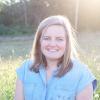From the top of the TV tower, 679 feet above Alexanderplatz, the IES Abroad Center is only discernible by the mural across the construction zone asking, “How Long is Now?” From there, your eyes can follow the wide street, Unter der Linden, all the way to the Brandenburg Gate. On Friday, September 20th, however, the Brandenburg Gate was noticeable not just for its pillars and that winged symbol of victory and reunification riding in her chariot, but also for the 270,000 people amassed around it.
I was lucky enough to have my dad visit me on Friday, Sept. 20th. We started with lunch in the TV tower, and from way up there, we decided to make our way to the climate demonstration around the Brandenburg Gate.
There is a word in German, Sorge (in German all nouns are capitalized). German to English dictionaries define Sorge as worry, anxiety, pain, trouble, sorrow, fear, apprehension, etc… I learned this word on my first weekend in Berlin in a conversation with my host-mother. She explained it to me as a fear for something in the future, anxiety over something that has not yet passed or may not pass. Parents have Sorge for their children, when they climb a tree or spend a semester abroad. But the verb, sorgen, means “to care (for).”
As I stood with my dad watching the never-ending mass of children, teenagers, parents, friends, and families march through the streets, I couldn’t help but think about Sorge. The streets were filled with children expressing Sorge, for their future, for the future of the earth; they are showing anxiety, fear, sorrow over the disaster that is coming and growing more and more imminent. And then all the parents, already filled with Sorge for their children, responding not only to their own understanding of climate change but also to the Sorge their children are expressing. But there is more, because sorgen is to care. All of those marching, all of us, who make decisions with the environment in mind, sorgen for the world. We care because of our anxiety, fear, sorrow.
Of course, there were also the signs. Signs with instructions, “Go Vegan”, “Plastik Verbot statt Meere tot!” (ban plastic instead of dead oceans); with pleas, “Take us Serious,” “Don’t talk. ACT!”; with lamentations, “Warum geht nach Schule, wenn keine Zukunft hat” (Why go to school when there is not future), and with clever word play, “No Planet B.” While the Planet B sign made me chuckle, the question/statement, why go to school when there is no future, made me think. What future is there for the marching children, and young people like me, in the direction we are going? Even while it’s pessimistic and demoralizing, I believe it is an important perspective to consider. I think, that’s true, why are we spending time investing in education, careers, long-term relationships, children when we are simultaneously destroying the very earth that allows us to have a future? It is easy to get lost in this death spiral of hopeless, discouraging thoughts, to sink into ambivalence because the situation seems so bad.
But there is hope. The children (and adults) all over the world who took to the streets on Friday, September 20th to spread awareness and fight for policy changes give us hope. Another hope is in the small decisions we make every day. I feel this power more acutely now that I live more independently. I can make choices every day: to ride my bike or take the train instead of drive, to use Tupperware instead of plastic bags, to fill up my water bottle instead of buying another plastic bottle, to buy locally grown food when I go grocery shopping and to bring my own bag, and to choose buses and trains instead of planes when I travel. More than that, I am twenty now, and unlike my young friends who have to skip school and march through the streets to express their voice, I am what Germans would describe as mündig, a politically mature, of age, voting, and therefore responsible adult.
I am so lucky to have witnessed the hundreds of thousands of people marching through Berlin, but I also know that even in my hometown, people came together to express their Sorge for the state of the earth and are making choices to sorgen.

Elena Bauer
<p>Apart from my first two years at Pacific Lutheran University in Tacoma, I have lived my whole life in Bellingham, Washington, a college town surrounded by green hills and snowy mountains on one side and the Puget Sound on the other. Since I was eleven, I've made a point to ride my unicycle down my town's Memorial Day parade route before it starts, a tradition interrupted briefly in high school when I was in the marching band. My summer job is teaching swim lessons, and I have gotten quite good at talking a scared four-year-olds into jumping off the diving board.</p>







